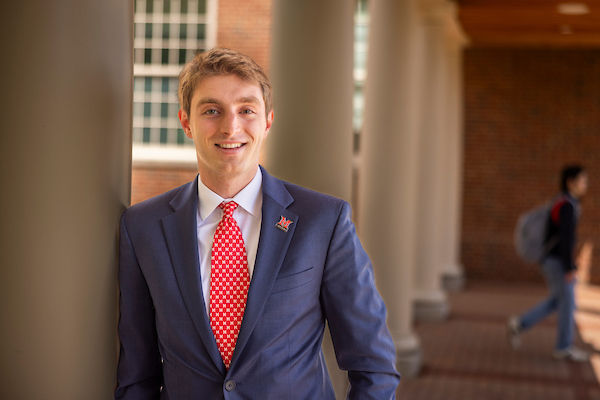Finding support at Miami University, connected by the same red tie
Jack Fazio, former student trustee, becomes an advocate for student mental health

Finding support at Miami University, connected by the same red tie
At every Miami University Board of Trustees meeting that he attended as a student trustee, Jack Fazio wore the same red Miami tie.
The tie was meaningful to the junior because it once belonged to William “Bill” Wendling ’67, a family friend who graduated with Jack’s grandfather. Wendling was fond of dressing from head to toe in clothing representing his beloved alma mater, where the polio survivor with a leg brace found a home.
Fazio recalled hearing the founder of Wendling Communications in Cleveland tell him about “how when he was here, it was the first time — and the first place — people were genuinely supportive,” said Fazio, a junior majoring in Microbiology with a Pre-Medical Studies co-major.
Wendling died in 2020, months before Fazio headed to Miami. Before the Avon Lake resident packed his bags to move to campus, Wendling’s widow, Lynne Woodman, mailed him a package. It contained his Love & Honor hat and the tie.
“When I’m wearing it, I remember Bill talking about what it means to be yourself — to be authentically and unapologetically yourself,” he said.
That advice came in handy when Fazio began serving on the board of trustees in June 2022. He provided a student perspective to the board and served as a student representative of the student body.
“It was always a reminder for me that in a room full of people who are so much more educated and successful and experienced than you are, that you can just unapologetically be yourself,” he said. “Remember, you are there for a reason.”
During his board term, which ended in February, Fazio became an advocate for mental health services for students and provided insight into his own experiences with campus services.
He was one of a handful of students who served on last year's institutional mental health taskforce. After the taskforce completed its final report, the group evolved into a committee charged with implementing the taskforce recommendations.
Fazio told the board, “I believe these recommendations are the next step to expanding access to mental health care to our students regardless of the barriers they face. As for the care and resources we already provide, I know that what we do here works because it has worked on me. I am happier than I was when I got here.”
Fazio has appreciated having a seat at the table and being a voice for all students.
“Every time we have a discussion about mental health, it’s not a question of ‘can we do it?’ It’s ‘how are we going to do it? How are we going to support students?’ And that trickles all the way down,” he said. “I’ve used the Student Counseling Center since the end of my freshman year, beginning of my sophomore year, and I’ve had great experiences there.”
Steve Large, assistant vice president for health and wellness for Student Life who leads the committee charged with implementing the taskforce recommendations, said Fazio has been a very engaged member of both the taskforce and committee for the past two years.
“Throughout each meeting, Jack reliably offered astute observations, student-centered ideas and perspectives, and passionate engagement that undoubtedly elevated each group's effectiveness and impact,” Large said.
Fazio, an emergency medical technician with the Oxford Fire Department who plans to go to medical school, said he keeps his mental health in check by viewing it as part of his overall experience of learning here at Miami, no different from a Microbiology course.
“Every other Friday this semester I go to MBI 464, human viruses. COVID antivirals will be this week’s lecture; Paxlovid and all that,” he said during a recent interview at Cafe Lux in the Armstrong Student Center.
“I’ll grab a cup of coffee here and then I’ll go to the counseling center. I spend an hour in class; I’ll spend an hour there. I view both of those as learning and growing here. They are different kinds of growth, but I view them almost the same way.”
When Fazio interviewed with the governor’s office for the appointed seat on the board of trustees two years ago, they asked him what he believed was the greatest threat to higher education in Ohio. “I told them that it was the mental health crisis. That answer has not changed,” he said in his farewell speech to the board of trustees.
Fazio said he has seen firsthand Miami’s commitment to student health. He believes that more and more, students are coming in with unresolved or undermanaged mental health issues that they will need help with.
“What we have now is the opportunity to build on our past work and make systematic changes that give every student the chance and the tools to do things in a better way,” he told the board.
The committee implementing the task force recommendations met consistently this academic year and made headway on implementing many of the recommendations, Large said. (Some committee updates can be found here.) The committee will resume meeting in the fall.